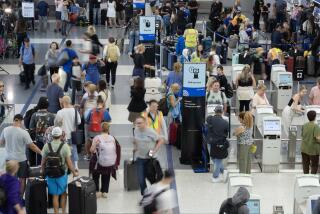TWA Crash Raises Flying Fears for Many
- Share via
Tarin Wilson and Helen Toth are seasoned travelers. But the crash of TWA Flight 800 has given them a serious case of the jitters.
Wilson, a partner in a Culver City special events consulting firm, says she hasn’t slept well the past few nights, worried about her flight to New York in two weeks to show off her newborn daughter to relatives.
Toth, who works in Washington, D.C., makes half a dozen international flights a year in her job developing training programs for teachers around the world. But now she says she is reluctant to take her next scheduled trip, to Egypt.
“After this crash, I’m not sure I love my job so much anymore,” she said. “It’s made me think twice” about going abroad.
Suddenly, Toth and others say, they are jumpy at the thought of getting on a plane. And the reason has more to do with the lack of an official explanation for the Paris-bound jumbo jet’s explosion than the mere fact that it went down.
Coming on the heels of the May 11 crash of a ValuJet DC-9 in the Florida Everglades and amid heightened sensitivity about possible terrorist attacks during the Olympic Games in Atlanta, this crash is taking its toll even on travelers who had considered themselves immune to flying phobias.
Psychologists say this latest crash has pierced many Americans’ sense of invulnerability, in part because it is the latest in a string of national traumas--from air disasters to last year’s Oklahoma City bombing.
“Fear is most strong when it is the fear of the unknown,” said Jerilyn Ross, a clinical social worker in Washington who heads the Anxiety Disorders Assn. of America, a nonprofit educational group.
“If bad weather caused the crash, then we say, ‘OK, we won’t fly in bad weather.’ Or, in the case of the ValuJet crash, we say, ‘OK, we won’t fly on small, discount airlines.’
“But the fact that we don’t know what caused this one makes people feel much more vulnerable. . . . And that sense of vulnerability just keeps building” with each new public disaster.
Travel agents are reporting some cancellations in the wake of Wednesday’s crash. But more noticeable, they said, is the rising number of inquiries from nervous clients about airline security and the safest routes.
“This seems to be the age of fear,” said Sue Ann Stout, who owns a travel agency in Montrose.
Toth said it is the possibility that terrorists sabotaged the TWA flight that has her on edge. “A mechanical problem is something that happens in life. But targeting people--that is frightening,” she said. “The whole thing is making me more cautious.”
She plans to be more watchful of her luggage and more aware of the other people boarding the plane with her when she sets off for Egypt next month.
“And I will not be resentful about being stopped and asked questions” by airline employees making security checks, she said. She would even tolerate higher ticket prices to pay for added security measures.
But many travelers are undeterred by the most recent crash.
At Los Angeles International Airport, Kathy Dillman, 53, of Pasadena was in a long line of people waiting for a seat assignment on a TWA flight to New York on Thursday.
“You know, disaster happens every day,” said Dillman, whose New York flight was to connect to a plane to Barcelona, where she plans to spend her vacation. “I don’t feel impending doom. Every day’s a risk.”
LAX spokeswoman Nancy Niles said the airport has not experienced any noticeable drop in passenger traffic since the TWA crash. If anything, some of the activity around ticket counters has been more frenetic than usual because of fare wars among domestic airlines.
John Armistead, a Los Angeles advertising executive, flew back from New York’s John F. Kennedy International Airport on the day of the TWA crash. “I have no fear” of flying, he said. But he said his wife, Amy, who accompanied him on the flight, was upset. “She wears a four-leaf clover chain and crystals and all kinds of stuff. I doubt if she will get on a plane any time soon.”
Oddly, the least traumatized may be those who already suffer from flying phobias. Ross, the Washington social worker who specializes in anxiety disorders, said she rarely hears from her airplane-phobic patients after a major crash.
“They know their fears are irrational, but when something like this happens” they feel vindicated, she said.
Times special correspondent Deborah Belgum contributed to this story.
More to Read
Sign up for Essential California
The most important California stories and recommendations in your inbox every morning.
You may occasionally receive promotional content from the Los Angeles Times.














